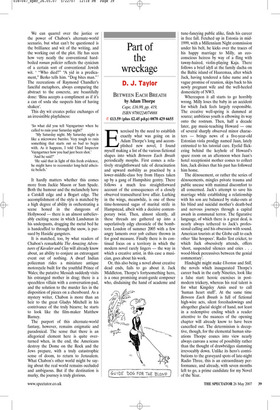Part of the wreckage
D. J. Taylor
BETWEEN EACH BREATH by Adam Thorpe Cape, £16.99, pp. 419, ISBN 9780224074988 ✆ £13.59 (plus £2.45 p&p) 0870 429 6655 Exercised by the need to establish exactly what was going on in Adam Thorpe’s long and accomplished new novel, I found myself making a list of the various fictional shapes into which Between Each Breath periodically morphs. First comes a relatively straightforward tale of deracination and upward mobility as practised by a lower-middle-class boy from Hayes taken up by a gang of Hampshire gentry. There follows a much less straightforward account of the consequences of a closely observed transcultural love affair. Lurking in the wings, meanwhile, is one of those time-honoured sagas of marital strife in Hampstead, albeit with a decisive contemporary twist. Then, almost silently, all these threads are gathered up into a superlatively edgy chronicle of the bombtorn London of summer 2005 with a few angry laments over yob culture thrown in for good measure. Finally there is its continual focus on a territory in which the modern novel rarely lingers — the way in which a creative artist, in this case a musician, goes about his work.
Or, this also being a novel about creative dead ends, fails to go about it. Jack Middleton, Thorpe’s fortysomething hero, is a once promising avant-garde composer who, disdaining the hand of academe and tune-fancying public alike, finds his career in free fall. Fetched up in Estonia in mid1999, with a Millennium Night commission under his belt, he kicks over the traces of his happy marriage to Milly, an ecoconscious heiress by way of a fling with tawny-haired, violin-playing Kaja. There follows a brief idyll at the family dacha on the Baltic island of Haaremaa, after which Jack, having tendered a false name and a vague promise of reunion, skips back to his newly pregnant wife and the well-heeled domesticity of NW3.
Whereupon it all starts to go horribly wrong. Milly loses the baby in an accident for which Jack feels largely responsible. The creative well-spring is dammed at source; ambitious youth is elbowing its way onto the rostrum. Then, half a decade later, gay music-teaching Howard — one of several sharply observed minor characters — brings news of a five-year-old Estonian viola prodigy named Jaan, lately entrusted to his tutorial care. Eyelid flickering behind the keyhole of Howard’s spare room on an afternoon when Jaan’s hotel receptionist mother comes to collect him, Jack divines that his past has followed him home.
The dénouement, or rather the series of dénouements, mingles private trauma and public unease with maximal discomfort to all concerned. Jack’s attempt to save his marriage while establishing a relationship with his son are balanced by stake-outs at his blind and suicidal mother’s death-bed and nervous journeys through a capital awash in communal terror. The figurative language, of which there is a great deal, is nearly always tethered to Jack’s professional calling and his obsession with sound. American tourists at the Globe call to each other ‘like hoopoes’. Radio Test cricket, to which Jack obsessively attends, offers ‘short, suspended silences and cries . . . wood-block percussives between the genial commentary’.
Hindsight might make Ulverton and Still, the novels which inaugurated Thorpe’s career back in the early Nineties, look like a false start: heroic exercises in postmodern trickery, whereas his real talent is for what Kingsley Amis used to call ‘human heart stuff’. At the same time Between Each Breath is full of fictional high-wire acts, silent foreshadowings and altogether glacial sleight of hand, not least in a redemptive ending which a reader attentive to the nuances of the opening chapter will already know to have been cancelled out. The determinism is deceptive, though, for the elemental human situations Thorpe coaxes into view nearly always canvass a sense of possibility rather than the thought of drawbridges slamming irrevocably down. Unlike its hero’s contributions to the graveyard spots of late-night Radio Three, this is an extraordinary performance, and already, with seven months left to go, a prime candidate for my Novel of the Year.


















































































 Previous page
Previous page